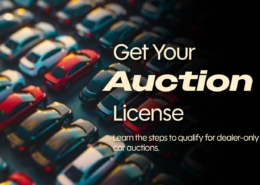 https://auction.ridesafely.com/images/2025/12/get-your-auction-license-banner.jpg
865
1440
RideSafely
/images/2025/01/ridesafely-logo.svg
RideSafely2025-12-04 16:42:472025-12-04 16:50:10How to Get a License to Buy Cars at Dealer Auctions
https://auction.ridesafely.com/images/2025/12/get-your-auction-license-banner.jpg
865
1440
RideSafely
/images/2025/01/ridesafely-logo.svg
RideSafely2025-12-04 16:42:472025-12-04 16:50:10How to Get a License to Buy Cars at Dealer AuctionsBuying a car at an online auto auction can be a daunting task, especially if it’s your first time. But, there are ways that you can make your first purchase a pleasant one by simply educating yourself on the various documents you need, including the salvage title of the vehicle you are interested in at the car auction.
Bill of Sale
There’s no document more significant than the bill of sale when purchasing a used car at an auction. Even if you were the highest bidder at the end of the auction, the bill of sale is the document that will cement the deal. Whether you’re purchasing a family car, a truck, an ATV, a trailer, or a snowmobile, the bill of sale serves as confirmation that you own the vehicle.
Another reason for the need for this document is that if you do not have a bill of sale after purchasing a vehicle at an online auto auction, it will be difficult to sell the vehicle. Another reason for the importance of this document is that it will be impossible to register or obtain a title certificate if you do not have a bill of sale after purchasing a vehicle at an online auto auction. It’s also worth noting that both the seller and the buyer must sign the bill of sale.
What is a Salvage Title?
Vehicles are given clean titles when they are originally registered, but if they are damaged or deemed a complete loss by an insurance provider, the titles might be “branded.” The Department of Motor Vehicles (DMV) issues titles, and the requirements differ from state to state. Some of the most common titles include: Non-repairable, bill of sale, junk, original, or salvage clear, depending on the choice you make. Learn more >
A junk certificate is another sort of title that is provided to automobiles that have been heavily damaged and cannot be restored or re-registered in several states. A Bill of Sale is a document that declares that the vehicle has no paperwork or title. Washington is an anomaly, as salvage titles are not issued there. Although certain cars with simply a Bill of Sale are recognized as exportable, the vast majority of vehicles with either of these titles cannot be registered or rebuilt in the United States.
Cars with clear or original titles have usually never been in a big accident. Cars that have been in significant accidents or natural catastrophes, on the other hand, may have clean titles simply because they were not designated a major loss by an insurance provider.
The term “non-repairable” means precisely what it says. After an accident, such lots are usually completely ruined and cannot be rebuilt for usage on public highways. They can, however, be exported before being dismantled or demolished, unlike trash cars. So, if you want to import an automobile, this is a good place to start. Nonetheless, we urge that you have an expert mechanical examination and a complete VIN history check to ensure that it is worth your money.
A salvage title or salvage certificate may be issued to a vehicle that has sustained substantial damage as a consequence of a collision, natural catastrophe, or theft. This signifies that the expected repair expenses exceed 75% (varies by state) of the car’s real cash worth. When an automobile is deemed a “total loss” by an insurance provider, it might be given a salvage title.
At salvage auctions, the most coveted automobile title is a clear title. In a nutshell, it indicates that the car is free of debt and does not require costly repairs. Nothing will be able to stop it from being sold. Usually, it’s low-mileage cars or donations. However, they can have a high amount of miles, so double-check the odometer reading as well at the car auction.
Import Documents
If you’re an overseas buyer, you’ll need special papers to export cars from the United States, and not all cars can be exported. You’ll need to supply the original car title and purchase agreement, as well as a Bill of Lading, which will be mailed to you once the vehicle has been delivered and cleared through US customs.
Vehicles having a Bill of Sale or a title stamped with lien/parts only/junk/scrap/certificate of destruction are not allowed to be exported. Automobiles with Florida Certificates of Destruction, or Washington Bill of Sale, and vehicles can be exported. For them, extra documentation is necessary, and we recommend contacting our shipping partners at EasyHaul if you’d want to export autos with those document kinds.
How Does CARFAX Work?
Because most people only have a basic grasp of vehicle mechanics, there’s a chance to sell old cars that look to be in good shape but have major faults — even ones that may cause you to die a mile down the road. Private citizen transactions do not necessarily entail a complete and open exchange of information about the car in question.
Buyers and sellers frequently meet through the internet and then never see one other again. When it comes to buying a used automobile, there are a number of possible deal-breakers. If the automobile has been in a series of accidents or has been declared wrecked by an insurance company, there’s a considerable possibility it’ll have major issues. Some vehicles have been recalled or classified by state motor vehicle authorities.
CARFAX reports include whatever information is accessible about: Previous collisions or vehicle damage, as well as other crucial information on the vehicle you are about to purchase at the used car auction.
Lemon status refers to vehicles that have been recalled or repurchased by dealers owing to significant issues. You can examine the overall number of owners, the period of ownership, and if the vehicle was used as a rental or corporate car by looking at the history of prior owners. Records of service and maintenance, which might include everything from oil changes to major engine repairs.
The information in a CARFAX report also includes warranty information, including whether or not the manufacturer’s warranty still covers your car. Crash-test results, safety recalls, and dependability ratings are only some of the general information and rankings available for a particular make and model.
Other Documents
The buyer and seller’s signatures will appear on the title. It also includes other vital details about the car, such as the date of sale (as stated on the documentation) and the mileage. If the car you bought at the online auction is older than ten years, you’ll also require an Odometer Disclosure Statement. This information should be included on the back of the title certificate and will verify that the vehicle’s odometer reading is accurate and verified.
You’ll also need a Damage Disclosure Statement, which essentially verifies that the car has been in an accident or has been damaged or ruined (or hasn’t). Also, for all 1976 automobiles, you should acquire a California Smog Certificate if at all feasible.
If you want to learn more about the documents you should look for when purchasing a car at an auto auction, then look no further than RideSafely.com to find out all of the information you need.






Leave a Reply
Want to join the discussion?Feel free to contribute!